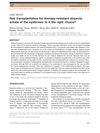Resistance of Transplanted Hair Follicles to Diffuse Alopecia Areata
March 2017
in “
The American Journal of Cosmetic Surgery
”
hair transplantation androgenetic alopecia alopecia areata incognita intralesional steroid injections dermoscopic features scalp biopsies autoimmune process scarring fibrosis autoimmune attacks genetic characteristics autoimmune-mediated inflammation hair transplant AGA AAI steroid injections scalp biopsy autoimmune disease autoimmune response genetic traits inflammation

TLDR Transplanted hair follicles can resist hair loss from an autoimmune condition better than natural hair.
In 2017, a case report was published about a 55-year-old man who had undergone successful hair transplantation for androgenetic alopecia (AGA) but later presented with rapid onset hair loss consistent with alopecia areata incognita (AAI) over the anterior to mid-scalp areas. Notably, the transplanted hair follicles remained intact despite the diffuse hair loss. Dermoscopic features and scalp biopsies confirmed the diagnosis of AAI. The patient was treated with intralesional steroid injections, which led to significant hair regrowth. This case is the first to demonstrate the relative resistance of transplanted hair follicles to the autoimmune process of AA compared to the surrounding indigenous hairs. The findings suggest that the scarring and fibrosis from the transplantation procedure may provide a protective barrier against autoimmune attacks, and that transplanted follicles retain their genetic characteristics, which may make them less susceptible to local autoimmune-mediated inflammation. This observation opens new avenues for research into AA pathophysiology and supports hair transplantation as a viable treatment option for patients with stable, localized AA that is resistant to other treatments. However, further studies are needed to confirm the protective nature of transplanted hairs in AA and to understand the long-term prognosis.







